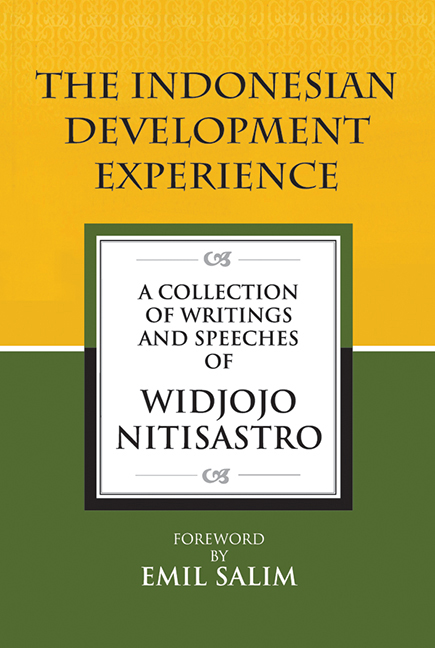Book contents
- Frontmatter
- Dedication
- Frontispiece
- Contents
- Foreword
- Introduction
- Part I PLANNING OF INDONESIA'S DEVELOPMENT
- Part II IMPLEMENTATION OF INDONESIA'S DEVELOPMENT
- Part III FACING VARIOUS ECONOMIC CRISES
- Part IV SETTLEMENT OF FOREIGN DEBT
- Part V EQUITABLE DEVELOPMENT
- 22 Equitable Distribution Programme (1979)
- 23 Fostering Small Scale Enterprises (1977)
- 24 Food, Family Nutrition and Intersectoral Cooperation (1978)
- 25 Reduction of Poverty: The Indonesian Experience (1994)
- Part VI INDONESIA AND THE WORLD
- Index
- About the Author
24 - Food, Family Nutrition and Intersectoral Cooperation (1978)
from Part V - EQUITABLE DEVELOPMENT
Published online by Cambridge University Press: 21 October 2015
- Frontmatter
- Dedication
- Frontispiece
- Contents
- Foreword
- Introduction
- Part I PLANNING OF INDONESIA'S DEVELOPMENT
- Part II IMPLEMENTATION OF INDONESIA'S DEVELOPMENT
- Part III FACING VARIOUS ECONOMIC CRISES
- Part IV SETTLEMENT OF FOREIGN DEBT
- Part V EQUITABLE DEVELOPMENT
- 22 Equitable Distribution Programme (1979)
- 23 Fostering Small Scale Enterprises (1977)
- 24 Food, Family Nutrition and Intersectoral Cooperation (1978)
- 25 Reduction of Poverty: The Indonesian Experience (1994)
- Part VI INDONESIA AND THE WORLD
- Index
- About the Author
Summary
Introductory Note: The improvement of family nutrition is a very important endeavor. In 1978, I gave a message to the working conference of the National Programme for Family Nutrition Improvement Efforts. Nutrition improvement efforts are activities that involve various sectors so that they should be undertaken through cross-sector cooperation, as is the case with the program for food production promotion, the programme for family planning and various other programmes.
It is important for the nutrition improvement efforts to benefit from previous experiences in multi-sector cooperation. I have described such multi-sector cooperation experiences here to serve as examples to be utilized by the nutrition improvement programme. Among the important instances cited are communication among the various central government agencies, among regional agencies, and between the central and regional agencies, and on the other hand information, reports or feedback from regions to the central government. Through the utilization of knowledge gained from these experiences in multi-sector cooperation in relation to various different activities, the nutrition improvement programme is expected to proceed smoothly.
Mr Chairman and distinguished participants of the national conference, first of all I would like to offer congratulations on the holding of the National Conference on Family Nutrition Improvement Efforts, a matter that we are all well aware is of major importance. This conference will hopefully provide important input for us in executing our respective duties.
Second, I wish to make it clear that I think there is probably not much I can convey to the participants of the national working conference this morning. Above all I believe that the conference participants are far more specialized than I am in the fields of diet, nutrition, health and other areas connected with nutrition, so that not much is left for me to contribute as thoughts to this meeting. Likewise, I believe this morning we all listened to the message of the President to this national working conference and the President's speech contains directives we need to observe. Therefore, as a contribution of ideas, I wish only to put forward a few things that may be relevant to this meeting today.
If I am not mistaken, this working conference will further discuss measures to strengthen the implementation of the national programme for Family Nutrition Improvement Efforts within the framework of a 1974 Presidential Instruction.
- Type
- Chapter
- Information
- The Indonesian Development ExperienceA Collection of Writings and Speeches, pp. 276 - 286Publisher: ISEAS–Yusof Ishak InstitutePrint publication year: 2011

